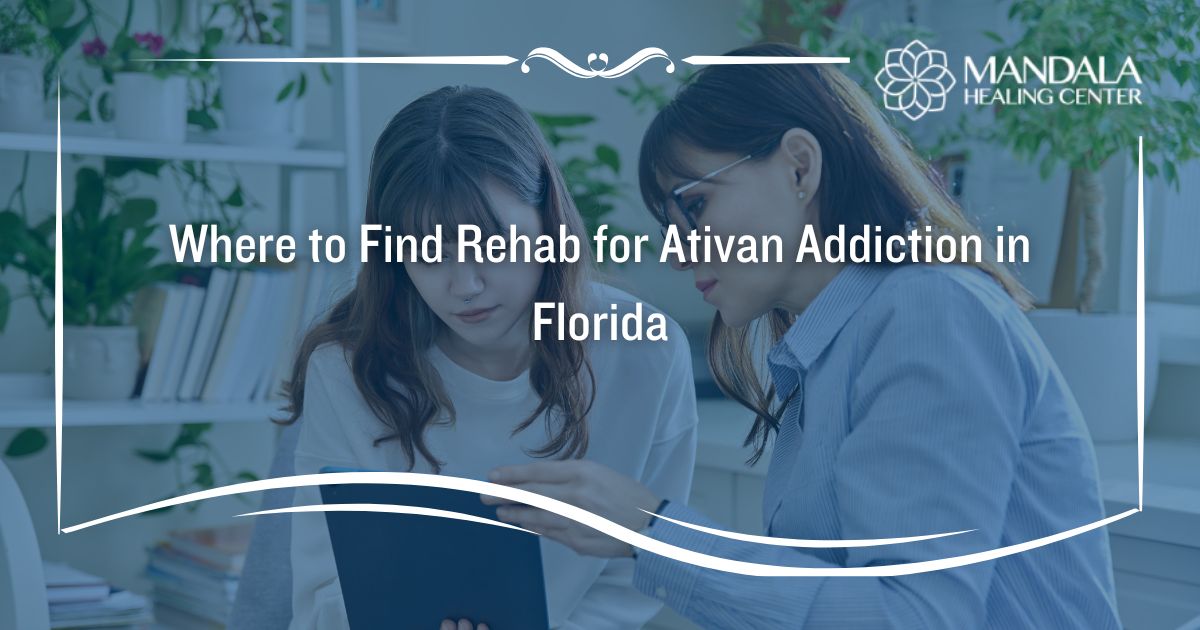Ativan is the brand name for a prescription benzodiazepine known as lorazepam. It is used to treat anxiety disorders, insomnia caused by anxiety, and even alcohol withdrawal symptoms.[1] While Ativan has legitimate medical uses, it is also known to be habit-forming and extremely addictive.
If you are addicted to a benzodiazepine like Ativan, you’ll need to attend a drug and alcohol rehab center. Most people who recover from Ativan addiction attend medical detox, inpatient rehab, and an outpatient treatment center. This continuum of care offers all of the tools and support you’ll need to make a full recovery.
Ativan addiction treatment in Florida can be hard to find if you have never attended a rehab program before. Thankfully, the Mandala Healing Center is here to offer an evidence-based and individualized addiction treatment program for Ativan addiction.
In this article, you will learn:
- What are the signs you need Ativan addiction treatment?
- Where can you find Ativan rehab in Florida?
- What types of Ativan rehab programs can you choose from?
Signs You Need Ativan Addiction Treatment
Ativan (lorazepam) is a central nervous system (CNS) depressant that is used by medical professionals to manage anxiety. Despite this, it is only intended for short-term or occasional use because it has the potential for abuse and addiction.
Addiction to Ativan can be difficult to spot on your own. The effects of addiction affect cognition and often lead to denial. In other words, you might not notice that you’ve developed a substance use disorder until someone else points it out.
Thankfully, there are tons of signs to look out for that indicate whether you need Ativan addiction treatment, including:[2]
- Using Ativan in larger amounts or for longer than intended
- Spending a lot of time obtaining or using Ativan
- Wanting to quit or cut back on Ativan use but being unsuccessful
- Experiencing urges or cravings to use Ativan
- Losing interest in previously enjoyed activities due to Ativan abuse
- Failing to meet responsibilities at home, school, or work because of Ativan use
- Continuing to use Ativan even though it is causing social, physical health, or mental health issues
- Using Ativan in risky situations, such as while driving
- Having to increase your dose of Ativan to experience the desired effect
- Experiencing withdrawal symptoms when you stop using Ativan
If you have two or more of the mentioned symptoms, you are dealing with a substance use disorder. You may require a professional addiction treatment program to achieve sobriety and prevent yourself from experiencing the long-term consequences of benzodiazepine addiction.
Where to Find Treatment for Ativan Addiction in Florida
Unfortunately, Ativan withdrawal can be life-threatening in severe cases. This means you’ll need a medical detox program to safely overcome Ativan withdrawal. You’ll also have to attend an addiction recovery center to address the root causes of your addiction and change negative behavioral patterns that contribute to substance abuse.
Luckily, there are plenty of options when it comes to Ativan addiction treatment in Florida. At the Mandala Healing Center, we offer a continuum of care that includes inpatient detox and long-term addiction treatment. Our program offers FDA-approved withdrawal medications, evidence-based therapies, relapse prevention planning, and more.
Why Choose The Mandala Healing Center? Clients are taken on a journey of healing through complete immersion into evidence-based clinical modalities, multifaceted alternative therapies, and expert medical management, allowing them to fully detox and recover from drug and alcohol addictions. Through a program of care designed to encourage change, a foundation is created that allows clients to find their higher purpose and reclaim their lives.
If you are looking to regain control over your life and stop abusing Ativan, the Mandala Healing Center is the best choice for achieving long-term recovery. Our admissions counselors can help you determine whether our program is a good fit for you.
Types of Ativan Rehab Programs: Which One is Right for You?
There are a few different options when it comes to Ativan addiction treatment programs. Each one offers a different level of care, which means you’ll need to determine what type of program suits your specific needs.
The main options when it comes to Ativan addiction treatment include:
- Medical Detox– These programs help you overcome withdrawal by using medical treatments and FDA-approved medications. They are the first step in recovery from Ativan addiction and are usually paired with inpatient or outpatient rehab.
- Inpatient Rehab- Inpatient rehab is the highest level of care available, requiring you to live at the facility for 30 to 90 days depending on your needs. You’ll have 24/7 access to care and support and a variety of evidence-based treatment services.
- Dual Diagnosis Programs- Dual diagnosis programs are a type of inpatient treatment that offers care for mental health conditions at the same time as Ativan abuse treatment. You’ll receive traditional addiction treatment methods like detox, therapy, and relapse prevention on top of clinically proven mental health services for the condition you are struggling with.
- Outpatient Treatment- Outpatient programs allow you to live at home while you receive addiction care. While this is beneficial for some, it offers less structure and accountability, which means you’ll need to be highly dedicated to your sobriety and have a certain level of support at home.
At the Mandala Healing Center, we can provide an in-depth assessment to determine what type of program is best suited to your needs.
Get Connected to Reputable Ativan Rehab in Florida
If you or a loved one suffers from Ativan addiction, it’s time to seek professional help. The Mandala Healing Center is here to provide you with the tools and support you need to achieve long-term recovery from Ativan addiction.
Contact us today to learn more about our Ativan rehab center in Florida.
References:
- Medline Plus: Lorazepam
- Medscape: Sedative, Hypnotic, Anxiolytic Use Disorders Clinical Presentation
















